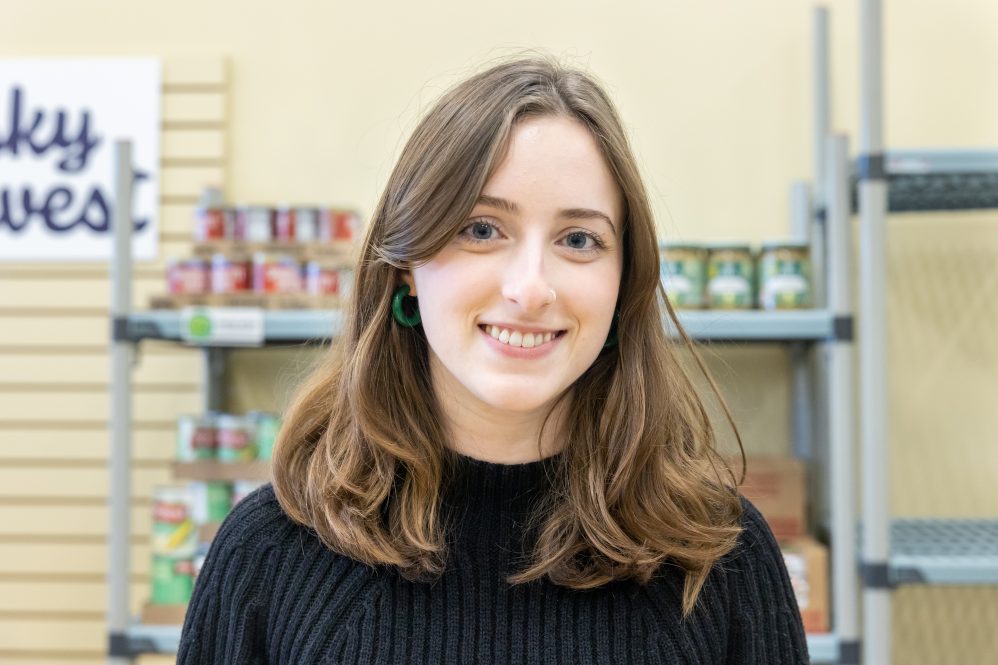By the time Lily Forand ’23 (CLAS) saw the inside of Husky Harvest in the Charter Oak Apartments Community Center, the food pantry had been operational a week and a half and had had a couple of successful days.
The shelves were nearly bare – save a couple baskets in the corner of red bliss potatoes and a few boxes of Husky pasta next to an empty space for sauce – prompting a sigh from Forand and her to wonder aloud whether there would be enough supply for the following week.

As the Undergraduate Student Government’s food insecurity advocacy coordinator, Forand worked with Dining Services to establish Husky Harvest at Storrs; she happened to be sick the week it opened, just after spring break, keeping her away from the crowd of opening day.
Feeling better now and seeing its bittersweet success, she says she’s concerned: “You can see most of the food is gone, which is good and bad. Connecticut Foodshare has been a wonderful resource in supporting the pantry, but it’s a really big campus with a lot of need.”
And it’s a need that will continue even after Forand graduates next month.
In her junior year, Forand says she worked as the USG external affairs director and in that capacity was responsible for gathering student testimony for bills before the General Assembly, including HB 5033, which sought to require state schools like UConn to evaluate and address campus food insecurity.
It was the first time the political science major came across the issue, realizing quickly just how big a problem it is for students. A 2019 survey determined that 35% of the UConn Storrs student body was going hungry, and the rate was even higher at the branch campuses, she says.
“Food insecurity is a lot of different things,” Forand explains. “The most obvious example of it is if you’re off campus and you don’t have a meal plan and you can’t afford food. But it could also be not having food available after the dining halls close at 7:15 p.m. If you’re staying up until midnight, as most college students are, and you don’t have a source of food and you can’t afford to buy a meal every night, that’s also a form of food insecurity.”
When she saw notice of this year’s job as food insecurity coordinator, she jumped at the opportunity to make a difference, starting with organizing a pop-up pantry in the Student Union in early December 2022.
Over two days, $10,000 worth of food went home with more than 500 students thanks to roughly $8,000 in funding from USG; an Amazon wish list Forand set up for donations that included contributions from friends, family, and neighbors in her West Hartford neighborhood back home; and collection box donations from around campus.
“It was kind of crazy to see the way faculty and staff responded to this issue,” she says, noting that one department even bought new coats to distribute.
During that pop-up event, 281 students submitted surveys on what they liked and what they didn’t about the location, food selection, hours, and other details. Forand says she and Dining Services Executive Director Michael White then used those results in developing plans for Husky Harvest.
The Amazon wish list produced more donations that stocked the pantry for about two weeks, while a semester’s worth of nonfood items like soap, detergent, and toothbrushes came from USG. Forand also helped to create a list of food assistance resources to give pantry visitors other places to seek help.
USG committed additional funding – and the manpower – for a grocery store splurge that arrived the morning Husky Harvest opened. Imagine, what seemed like an unending parade of cases of food being carried in, then stacked on shelves and stored in refrigerators to round out the staples procured from Connecticut Foodshare.
“In college, there’s this culture of ‘eat ramen and get through it, eat cheap food, and that’s part of college.’ It really isn’t. Just because someone’s in college doesn’t mean they should have to survive off less nutrient-rich food,” Forand says.
No one should have to live that way.
Next year, Forand plans to continue to fight for the hungry, whether through advocacy, planning and organizing, or simply donating time at a pantry near where she lands after graduation. With an interest in political journalism, she’s applying for a BOLD Women’s Leadership Network program that would allow her to work and take graduate classes next year.
In the remaining weeks of this semester, she hopes to research other ways for the pantry to access food through donations or purchase and emphasize to University leadership the importance of maintaining a fully stocked pantry.
She also wants to convey the need for another student survey to determine the rate of food insecurity three years after that first survey and two years after the pandemic. Her own survey at the pop-up pantry asked how often the respondent had experienced food insecurity – around 70% said they had difficulty accessing or affording food within the prior month.
“If I wasn’t passionate about food insecurity, then I wouldn’t have put in the work that I have. But part of what keeps me going is that I’ve found an area where I can contribute,” she says, adding that food insecurity, if it isn’t the biggest, is among the biggest issues on campus.
Changing that is important to Forand.
“It’s also a sense of wanting to help the community I’m in before I leave,” she says.



